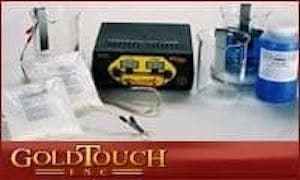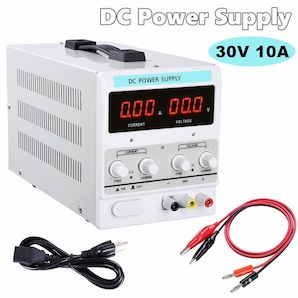
Curated with aloha by
Ted Mooney, P.E. RET

The authoritative public forum
for Metal Finishing 1989-2025

-----
Hobbyist plating onto lead-free solder
October 8, 2011
Hi, I have read many many posts here with great interest, specifically with regard to something I wish to do for electronics prototyping: Plating 30-50 µm of copper onto solder wire. I soon became clear that 'tin-lead' solder wire would prove troublesome given the lead content, but lead-free (usually Sn 96.5%, Ag 3%, Cu 0.5%) solder wire would do me just fine.
Given that I'm a hobbyist, and the solder wire in question will be between 0.7 and 1.0 mm diameter, this is by no means 'large scale'. I have access to constant current supplies, copper sulphate
⇦ this on
eBay or
Amazon [affil links] (penta-hydrate) as well as some acids (H2SO4, HCl etc..) so before I start making a huge mess, I thought I would ask for advice with regard to surface preparation and/or activation. Also, I have read about 'self plating' of copper onto tin-lead alloys: in a quick experiment I dipped (sans current) a standard 60/40 tin/lead solder wire, and a lead-free solder wire into 'jax's copper plating solution', which is simply copper sulphate in sulfuric acid. The leaded wire self plates, with beautiful copper, that happily peels/flakes off (expected). but the lead-free wire does not plate at all, leaving only a dark sludge, is this tin-sulphate? I'm assuming the acid is corroding the tin, and no self plating occurs, being without current.
My questions are:
1 - Could I use 'acid copper plating', along with correct surface preparation, and plate the parts by dipping them in with the current applied first?
1a - just thought, what would be the best surface preparation for tin? (it's a home setup, so of course, major nasty chemicals aren't an option, even if money allowed).
2 - if acid copper plating is not advised, then I have read about a citric acid
⇦ this on
eBay
or
Amazon [affil links] and NaOH alkaline bath for producing a copper strike (ph = 11). But I am unsure how the tin alloy would react in this alkaline solution.
3 - Would a constant current supply be recommended? - as an electronic engineer by profession, a well controlled 10ma - 3A CC power supply can easily be built. As well as constant voltage, with set limits. Hell, I could even knock up a periodic pulse reversal supply if needs be.
Time is not critical, I am happy to wait hours/days providing the plating has good adhesion, ductility, hardness, and is relatively even. Doesn't have to be shiny! It will then be plated with a very thin coating of tin (using an immersive 'tinnit' type solution) for protection, which I do on homemade circuit boards anyway.
Apologies for a long winded post, but I guess the more information the better. Thanks!
Hobbyist - Hertfordshire, UK
A. Hi Scott.
A typical plating sequence is cleaning, rinsing, acid activation, rinsing, plating, rinsing.
Since you say this is prototyping, not production, and you want to avoid 'nasty' chemicals, you can just scrub the wire with pumice and warm water and maybe a dash of liquid detergent. You can probably use a dip in 10% H2SO4 for a minute for the activation. I think you're better off buying an acid copper plating process from a hobby supplier than mixing copper sulphate and sulfuric acid, but your choice.
Yes, you can build your own constant current power supply but for only $60-$75 you have a wide range of small professional power supplies these days.
Luck & Regards,

Ted Mooney, P.E.
Striving to live Aloha
finishing.com - Pine Beach, New Jersey
Gold Plating Lead Free Solder for Stained Glass Jewelry
September 18, 2020Q. Hello!
I am an artist and am starting a stained glass jewelry business. I am trying to achieve a gold or rose gold finish to my soldered glass pieces to match brass chains. Of the materials typically used in stained glass, copper patina doesn't work with lead free solder (which is essential for jewelry to prevent lead exposure), and black patina doesn't stand out enough in combination with my brass chains. I have been looking into electroplating, and have a couple of questions:
Can lead free solder (91% tin, 4% Antimony, 3% copper, 2% silver) be gold plated easily?
Is there a substance other than nickel that can be used as an interlayer between the solder and the gold plating?
Does anyone have recommendations for an affordable yet reputable pen plating kit? (Ideally $200 or less)
Any other ideas for applying a gold finish to lead free solder?
Thank you so much for your help! :)
Alanna
- Olympia Washington
September 2020
A. Hi Alanna. I do not know for sure the best pretreatment for your lead-free solder, but I suspect that scrubbing with pumice and dipping in sulfuric acid, as explained to Scott, above, will be okay. I also expect pen plating will give you better plating adhesion onto tin than tank plating.
The only really good alternative to nickel that I know of is "white bronze", sometimes called tri-alloy, or Miralloy, Albaloy, etc. I don't know if these are easily available for pen plating though.
Sorry we can't suggest or post suggestions for brands or sources (why?), but Gold Touch [a finishing.com supporting advertiser] is a possibility for brush plating equipment and supplies.
Luck & Regards,

Ted Mooney, P.E. RET
Striving to live Aloha
finishing.com - Pine Beach, New Jersey
Q. Thank you so much Ted!
I've been looking into sulfuric acid as a surface preparation to gold plate tin and it looks pretty dangerous and scary. Is there any less toxic material that would work as acid activation? Would white vinegar
⇦in bulk on
eBay
or
Amazon [affil links] work or does it need to be a stronger acid?
All the best,
Alanna
- Olympia Washington
September 21, 2020
A. Hi Alanna. Although 96% sulfuric acid is indeed scary, the 5 to 8% sulfuric acid you would be using is much less so, and the plating solutions you will be using may have that high a concentration of sulfuric acid anyway.
As a hobbyist you may be able to get away with vinegar; the issue is not just 'strength' but 'compatibility'. Production platers can't afford to introduce extraneous materials like acetic acid ⇦ this on eBay or Amazon [affil links] into their sulfuric acid-based plating baths on a continuous basis, but that probably isn't a real issue for you.
Luck & Regards,

Ted Mooney, P.E. RET
Striving to live Aloha
finishing.com - Pine Beach, New Jersey
September 2020
![]() That makes sense! Thank you Ted! I really appreciate you sharing your knowledge and how fast your replies are!
That makes sense! Thank you Ted! I really appreciate you sharing your knowledge and how fast your replies are!
Best,
Alanna
- Olympia Washington
September 22, 2020
adv.
Brush plating equipment, chemicals, and supplies from Gold Touch

Q, A, or Comment on THIS thread -or- Start a NEW Thread
